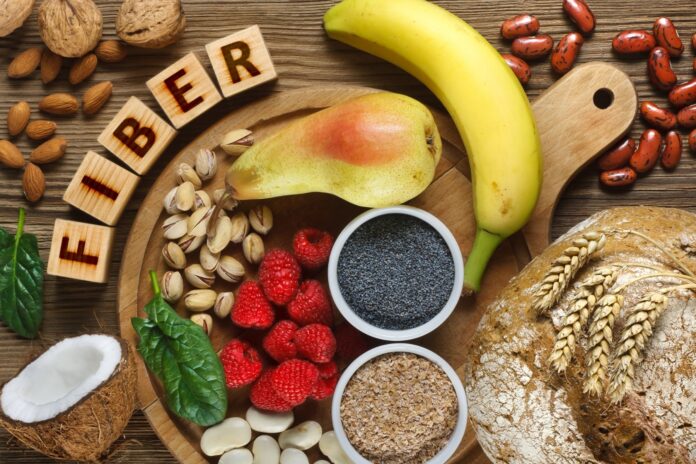Fiber is an essential component of a healthy diet, contributing to various bodily functions and overall well-being. There are two primary types of dietary fiber:
Types of Fiber
- Soluble Fiber
- Sources: Oats, peas, beans, apples, citrus fruits, carrots, barley, and psyllium.
- Benefits: Soluble fiber dissolves in water to form a gel-like substance. It can help lower blood cholesterol and glucose levels, improve heart health, and aid in weight management by making you feel full longer.
- Insoluble Fiber
- Sources: Whole wheat flour, wheat bran, nuts, beans, cauliflower, green beans, potatoes.
- Benefits: Insoluble fiber promotes the movement of material through your digestive system and increases stool bulk, making it beneficial for those who struggle with constipation or irregular stools.
Benefits of Fiber
- Digestive Health: Fiber aids in maintaining bowel health and regularity, preventing constipation and reducing the risk of diverticulitis.
- Heart Health: Soluble fiber can help lower blood cholesterol levels by binding to cholesterol and preventing its absorption.
- Blood Sugar Control: Fiber, particularly soluble fiber, can slow the absorption of sugar and help improve blood sugar levels, beneficial for people with diabetes.
- Weight Management: High-fiber foods are more filling than low-fiber foods, which can help control weight by making you feel full longer.
- Cancer Prevention: Some studies suggest a high-fiber diet may reduce the risk of developing certain types of cancer, including colon cancer.
Harm Caused by Excess Fiber
While fiber is crucial for health, consuming it in excessive amounts can lead to negative effects:
- Digestive Issues:
- Bloating and Gas: Excessive fiber can cause bloating and gas, particularly when the increase in fiber is sudden.
- Constipation or Diarrhea: Too much fiber, especially without adequate water intake, can lead to constipation. Conversely, too much soluble fiber may cause diarrhea.
- Nutrient Absorption:
- Interference with Mineral Absorption: Excess fiber can interfere with the absorption of essential minerals like iron, calcium, magnesium, and zinc.
- Bowel Obstruction:
- Severe Cases: In rare cases, extremely high fiber intake without adequate hydration can lead to bowel obstruction, particularly in individuals with pre-existing digestive conditions.
- Abdominal Discomfort:
- Cramping: High fiber intake can lead to abdominal cramping, especially if your digestive system is not used to a high-fiber diet.
Recommendations
- Gradual Increase: Increase fiber intake gradually to allow your digestive system to adjust.
- Hydration: Drink plenty of water to help fiber move through your digestive tract.
- Balanced Diet: Ensure a balanced intake of both soluble and insoluble fiber from a variety of food sources.
Understanding the balance and types of fiber can help you reap the benefits while minimizing potential negative effects.



